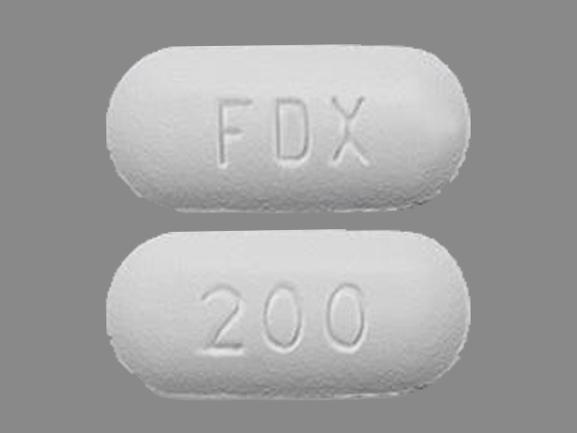Dificid Side Effects
Generic name: fidaxomicin
Medically reviewed by Drugs.com. Last updated on Feb 16, 2025.
Note: This document provides detailed information about Dificid Side Effects associated with fidaxomicin. Some dosage forms listed on this page may not apply specifically to the brand name Dificid.
Applies to fidaxomicin: oral powder for suspension, oral tablet.
Precautions
It is very important that your doctor check your progress after you finish taking this medicine. This will allow your doctor to see if the medicine is working properly and to decide if you should continue to take it.
If your symptoms do not improve within a few days after you start this medicine or if they become worse, check with your doctor.
This medicine may cause serious allergic reactions, including angioedema. Angioedema can be life-threatening and requires immediate medical attention. Call your doctor right away if you have a rash, itching, trouble breathing, trouble swallowing, or any swelling of your hands, face, or mouth while you are using this medicine.
Do not take any medicine to treat diarrhea without first checking with your doctor. Diarrhea medicines may make the diarrhea worse or make it last longer. If you have any questions about this or if mild diarrhea continues or gets worse, check with your doctor.
Serious side effects of Dificid
Along with its needed effects, fidaxomicin (the active ingredient contained in Dificid) may cause some unwanted effects. Although not all of these side effects may occur, if they do occur they may need medical attention.
Check with your doctor immediately if any of the following side effects occur while taking fidaxomicin:
Less common side effects
- abdominal or stomach pain
- bloating
- bloody or black, tarry stools
- chills
- confusion
- cough
- drowsiness
- fever
- loss of appetite
- lower back or side pain
- muscle tremors
- nausea
- painful or difficult urination
- pale skin
- rapid, deep breathing
- restlessness
- severe constipation
- shortness of breath
- sore throat
- stomach cramps
- troubled breathing with exertion
- ulcers, sores, or white spots in the mouth
- unusual bleeding or bruising
- unusual tiredness or weakness
- vomiting
- vomiting of blood or material that looks like coffee grounds
Incidence not known
- difficult or labored breathing
- itching skin or rash
- large, hive-like swelling on the face, eyelids, lips, tongue, throat, hands, legs, feet, or sex organs
- tightness in the chest
Other side effects of Dificid
Some side effects of fidaxomicin may occur that usually do not need medical attention. These side effects may go away during treatment as your body adjusts to the medicine. Also, your health care professional may be able to tell you about ways to prevent or reduce some of these side effects.
Check with your health care professional if any of the following side effects continue or are bothersome or if you have any questions about them:
Less common side effects
- abdominal or stomach distension or tenderness
- acid or sour stomach
- belching
- blurred vision
- difficulty with swallowing
- dry mouth
- excess air or gas in the stomach or intestines
- flushed, dry skin
- fruit-like breath odor
- full feeling
- heartburn
- increased hunger
- increased thirst
- increased urination
- indigestion
- passing gas
- stomach discomfort or upset
- sweating
- troubled breathing
- unexplained weight loss
See also:
For healthcare professionals
Applies to fidaxomicin: oral liquid, oral tablet.
Gastrointestinal adverse events
- Very common (10% or more): Nausea (up to 11%)
- Common (1% to 10%): Vomiting, abdominal pain, diarrhea, constipation, gastrointestinal hemorrhage, upper abdominal pain
- Uncommon (0.1% to 1%): Abdominal distension, flatulence, dry mouth
- Frequency not reported: Abdominal tenderness, dyspepsia, dysphagia, intestinal obstruction, megacolon, lower abdominal pain[Ref]
Metabolic
- Common (1% to 10%): Hypokalemia, hyperkalemia, hypomagnesemia
- Uncommon (0.1% to 1%): Anorexia, decreased appetite
- Frequency not reported: Hyperglycemia, metabolic acidosis[Ref]
Nervous system
- Common (1% to 10%): Headache, dizziness
- Uncommon (0.1% to 1%): Dysgeusia[Ref]
Other
- Common (1% to 10%): Pyrexia, peripheral edema, fatigue
- Uncommon (0.1% to 1%): Chills
- Frequency not reported: Increased blood alkaline phosphatase, decreased blood bicarbonate[Ref]
Genitourinary
- Common (1% to 10%): Urinary tract infection[Ref]
Hematologic
- Common (1% to 10%): Anemia, neutropenia
- Frequency not reported: Decreased platelet count[Ref]
Hypersensitivity
- Postmarketing reports: Hypersensitivity reactions (dyspnea, angioedema, rash, pruritus)[Ref]
Respiratory
Psychiatric
- Common (1% to 10%): Insomnia[Ref]
Cardiovascular
- Common (1% to 10%): Hypotension[Ref]
Dermatologic
- Common (1% to 10%): Pruritus
- Uncommon (0.1% to 1%): Rash
- Frequency not reported: Drug eruption, urticaria, follicular rash, maculopapular rash, exfoliative rash[Ref]
Musculoskeletal
Hepatic
- Uncommon (0.1% to 1%): Increased ALT
- Frequency not reported: Increased hepatic enzymes, increased AST[Ref]
References
1. Cerner Multum, Inc. "UK Summary of Product Characteristics."
2. Cerner Multum, Inc. "Australian Product Information."
3. (2011) "Product Information. Dificid (fidaxomicin)." Optimer Pharmaceuticals
Frequently asked questions
More about Dificid (fidaxomicin)
- Check interactions
- Compare alternatives
- Pricing & coupons
- Reviews (16)
- Drug images
- Dosage information
- During pregnancy
- Generic availability
- FDA approval history
- Drug class: macrolides
- Breastfeeding
- En español
Patient resources
Professional resources
Related treatment guides
Further information
Dificid side effects can vary depending on the individual. Always consult your healthcare provider to ensure the information displayed on this page applies to your personal circumstances.
Note: Medication side effects may be underreported. If you are experiencing side effects that are not listed, submit a report to the FDA by following this guide.

